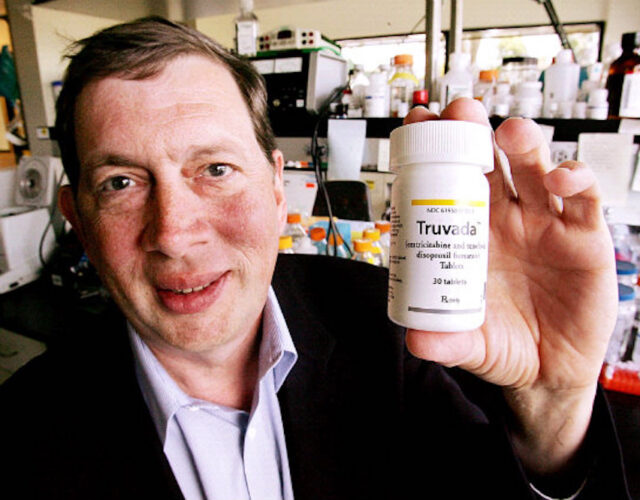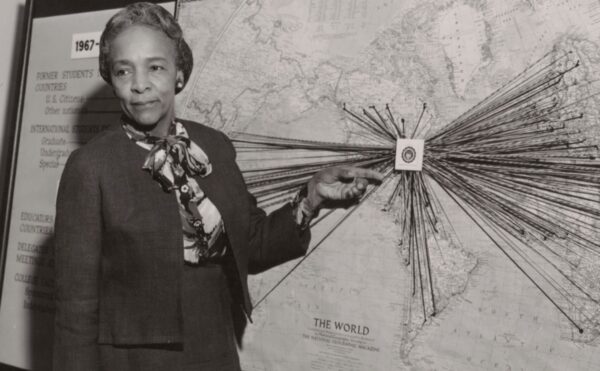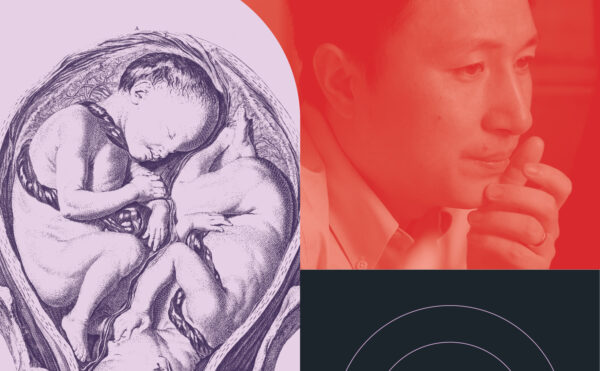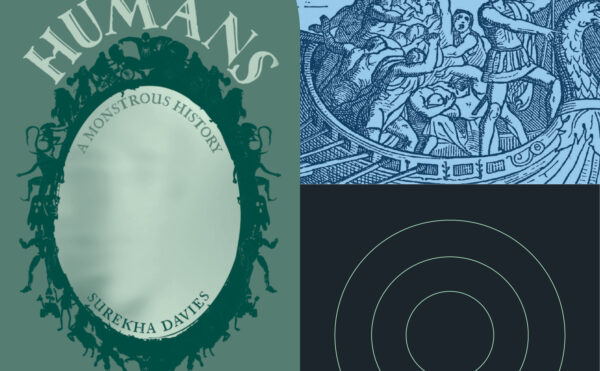Over the next several weeks, Distillations will be talking to people with special insight into the coronavirus crisis—biomedical researchers, physicians, public health experts, and historians.
In this episode, we speak with John C. Martin, a biomedical researcher and former CEO of Gilead Sciences. Gilead is a pharmaceutical giant best known for its antiviral therapies for HIV/AIDS and hepatitis, but it’s also the company behind remdesivir, an antiviral drug that has recently made headlines as a possible treatment for COVID-19.
Martin talked to senior producer Mariel Carr about remdesivir, antiviral treatments for HIV and other illnesses, and working with Anthony “Tony” Fauci.
For more information about John C. Martin, see the Science History Institute’s oral history interview.
Credits
Hosts: Alexis Pedrick and Elisabeth Berry Drago
Senior Producer: Mariel Carr
Producer: Rigoberto Hernandez
Researcher: Jessica Wade
Music: “Balti,” “Tuck and Point,” and “Slimheart” by Blue Dot Sessions.
Image: Former Gilead CEO John C. Martin holds bottle of Truvada (Paul Sakuma/Associated Press)
Resource List
“Fauci: New Drug Remdesivir Cuts Down Coronavirus Recovery Time,” NBC Nightly News. April 29, 2020.
Transcript
Alexis: Hello and welcome to Distillations. I’m Alexis Pedrick.
Lisa: And I’m Lisa Berry Drago. In our former lives, you know, way back years and years ago in the before times …
Alexis: Actually, Lisa, I think it’s really only been like six or seven weeks.
Lisa: Ah, if you say so. Well, anyway, what I’m trying to say is that usually here at Distillations, we dive into stories that while relevant to our lives now, either happened in the past or are just around us all the time.
Alexis: Like migraines or rare earth elements.
Lisa: We aren’t used to talking about anything close to breaking news. But since we’re a podcast that talks about the role of science in our lives, we couldn’t ignore the elephant in the self-isolated room, COVID-19.
Alexis: So we’ve been working on a brand-new series focused entirely on the coronavirus. Over the next several weeks we’ll be bringing you interviews with people working at the heart of the crisis, including biomedical researchers, physicians, public health experts, and yes, historians too.
Lisa: This first episode is with John C. Martin, a biomedical researcher and the former CEO of Gilead Sciences. Gilead is a pharmaceutical giant that focuses on antiviral therapies, namely, for HIV and AIDS, but they’re also the company behind remdesivir, an antiviral drug that has recently made headlines for being a hopeful treatment for COVID-19.
Alexis: John Martin talked to our senior producer, Mariel Carr, about remdesivir antiviral treatments for HIV and working with Anthony Fauci.
Mariel: Thank you so much for joining us. Please introduce yourself for us.
John Martin: Yeah. My name’s John Martin. I’m a scientist trained in organic chemistry that worked the last four decades in medicinal chemistry for a variety of companies. Most prominently, I started 30 years ago when Gilead was a very small company. I’d led the development of that to be an antiviral powerhouse that has really changed medicine, in HIV, viral hepatitis, influenza, and other diseases.
Mariel: So I have to tell you that I just 10 minutes ago said, let me just check the news and see if there’s anything relevant that has recently happened. And I saw the news about remdesivir. I’m not pronouncing that correctly.
John Martin: Yeah, that’s close, remdesivir.
NBC Archival: For doctors and nurses on the front lines a new weapon in the fight against COVID-19: an antiviral medication proven effective in clinical trials. Dr. Fauci announced a breakthrough at the White House.
Mariel: So I thought that was a funny coincidence to sort of hit the news right before we were talking.
John Martin: Perfect.
Mariel: I wish I could say I planned it this way.
John Martin: Tony Fauci is just now in the White House with the Louisiana governor talking about it.
NBC Archival: (Dr. Fauci) The data shows that remdesivir has a clear-cut, significant positive effect in diminishing the time to recovery. This is really quite important.
(Newscaster) The drug is remdesivir made by Gilead Sciences. It comes in IV form administered to the sickest COVID patients. The drug trials involved nearly 1,100 people worldwide. The preliminary NIH data showed remdesivir cut the recovery time in the hospital from 15 to 11 days.
John Martin: The news this week is apparently the news we’ve been waiting for, and I look forward to hearing the scientific details, which presumably will come out over the course of today and this week. You know, publications are coming out very rapidly. With electronic publication we see data analysis almost published in real time, and it’s important for scientists to actually see the published data to be able to analyze and interpret what these results mean.
Mariel: So Gilead is best known for antivirals to treat and prevent HIV, hepatitis. It’s actually—I only recently learned—also behind Tamiflu. Where does remdesivir fit into its history?
John Martin: Tamiflu came along a couple of years before big pandemic flu, but less than 20 years ago it led to stockpiling all around the world.
Most of my colleagues, we still travel with Tamiflu when we go internationally because it works for treatment and prevention. Hopefully there’ll be a solution like that eventually to coronavirus in addition to the vaccine.
Mariel: Right.
John Martin: Most people get a flu vaccine every year, but there’s still a disease that we need treatment and pill prevention for.
So remdesivir came out of a respiratory program at Gilead quite a few years ago that was looking for activity against one of the common respiratory viruses, respiratory syncytial virus. But in that program, specifically remdesivir was discovered as a broad-spectrum antiviral against many of the pandemic viruses that are emerging.
And so a good example is, of course, SARS, which happened about 15 years ago, 17 years ago. It’s active against MERS. And importantly, there were studies for Ebola when we were concerned Ebola could spread to the United States. And it was at that time that Gilead made a substantial stockpile of remdesivir to prepare for potential Ebola outbreaks and also awareness of coronaviruses, for instance, for when MERS became a problem in the Middle East and Korea. So that stockpile being on hand is what allowed Gilead to respond quite rapidly to this current pandemic. And as you know, there’ve been a lot of studies, some of them in ill patients, very ill patients where you wouldn’t necessarily expect to see a benefit.
And I can give the example of Tamiflu. Influenza is a very rapid infection, and Tamiflu to be efficacious against influenza needs to be given within the first 48 hours of symptoms.
Mariel: Yeah, this winter both my husband, well, first my husband got the flu, and then as soon as I felt like the first sniffle, I was able to get Tamiflu.
He was unfortunately not able to do that. But you know, I just talked to my doctor, and she was like, yup, here you go.
John Martin: Yup. Well that’s perfect because if, you know, if you take it right away, if you take it within two days, you reduce symptoms, but if you take it right away or take it before you have symptoms, you have a much better outcome of course.
So you had that personal experience.
Mariel: So just back to remdesivir for a minute, and just to clarify. It’s a drug that’s been around for a while, and it’s been investigated. But it’s never actually, it hasn’t really been used anywhere yet.
John Martin: Yup. Only studied. It’s not approved anywhere in the world. It was originally being investigated for a very common respiratory pathogen called respiratory syncytial virus, but it didn’t move forward for that indication.
And then it was studied for emerging viruses like coronaviruses, like Ebola, but it hadn’t found its place in those infections either. And part of it, uh, the diseases in the past have been self-limiting. As you know, SARS was contained and went away. MERS was also contained. It started in the Middle East, and there was a serious outbreak in Korea, but it didn’t really get beyond that.
So this is unique in the time that remdesivir has been studied that there’s such a serious outbreak that’s affecting society so dramatically.
Mariel: So is it too soon to say, like, does it seem like this will be effective for coronavirus?
John Martin: Well, we haven’t seen the data yet, but it was announced today that it was effective in the NIH study.
And I’d just like to point out your experience with Tamiflu versus your husband’s, how you need to take it early. And most of the studies with remdesivir have been people who were quite ill, and we don’t know a lot about how the coronavirus progresses, but we do know influenza, by the time people are in the hospital, it’s for inflammation in the lungs due to the virus, secondary infections. If you want to head that off, you want to treat a virus early in the course of the disease before the disease gets bad. Your immune system is causing a lot of the problems in your body because it fights the virus. If you stop the virus replication early, you reduce, you can prevent the development of serious symptoms with influenza.
Mariel: So, um, I’m going to back up a little bit. So, you know, the average person is sort of living through this pandemic right now, and it feels like, to people that are not, you know, in the field of medicine or in science, that this kind of came out of nowhere. But talk to me about what it’s like for someone like you.
Is this out of nowhere, or is this sort of, you knew this was coming or something like this?
John Martin: Well, there’ve been a number of these pandemics, and they always seem acute when they happen and we all get, uh, fairly scared. This particular coronavirus, it caught everyone by surprise because it is so contagious.
And what wasn’t realized at first is people without symptoms can still transmit the virus. So there’ve been a number of scholarly papers now that half the people who get infected by the virus are infected by someone without symptoms yet. And the vast majority of people, you know, recover very well from infections, including maybe half who never even developed symptoms.
So for most people it’s not that dangerous. But again, what is unique—for a small number of people it’s highly fatal. And the medical system has struggled and worried about being overwhelmed across the country. And of course that did happen in some hospitals in New York, but broadly that hasn’t happened because of all the shelter-in-place rules that have been put out by states. There’s also, you know, examples of other countries that have controlled it in different ways. So this is a pandemic that we’re learning more about every day, and it’s the uncertainty and unknowns that make us all worried very much about our personal safety.
Mariel: Yeah. So I noticed that you called Anthony Fauci, Tony Fauci. So this is someone who’s been a government scientist for decades, and all of a sudden …
John Martin: I’ve worked with him since the 1980s. He’s always been there.
Mariel: Right. And he’s sort of a celebrity now to the average person. Tell me a little bit about him and working with him and …
John Martin: Well, he’s not different than what everyone sees on TV.
He’s a dedicated public servant. He’s been involved in every activity that has been in infectious diseases for decades. When I started working on HIV and other viruses in the 1980s, I got to know him back then. So for nearly 40 years we’ve lived in a similar world. He, he’s been famous over and over as we’ve had these things happen.
I’m pretty sure he’s testified in front of Congress hundreds of times. I gave a talk in 2007 to several thousand infectious disease doctors, and one of my slides was a quote from Fauci on HIV. “We won’t be judged on our last 25 years of success but our next 25 years of success.” So he’s always been that type of visionary person that, uh, it’s very important for the nation.
Mariel: How do you think the world is going to be different after this? Will science be different? Will the way that we do basic research or even just the way that people think about it, do you think that’ll change?
John Martin: What I feel is that science progresses so rapidly, that this will only fuel that rapid change of scientific innovation.
Who would have thought five years ago, we’d have so much going on on gene therapy as we do today. The vaccine technology, a lot of the vaccine technology that’s being done now. There’s technology that’s novel that didn’t exist five years ago that allows for these very rapid vaccines to be developed. But I’m always an optimist.
But the attention and advances in science are coming at such a phenomenal rate now that I believe that will continue. My concern of course is sort of the people I work with; we’re all very busy. We’re figuring out ways to be efficient and with, you know, embracing different types of technology, but to, you know, how to open up the economy, get people back to work.
What is going to be the standard of how we work together? All that’s evolving in real time. My concern is not necessarily scientific; it’s more just one we face as a society—how do we get organized to get on with our lives?
Mariel: Thank you so much for taking the time to talk with us.
Lisa: Thanks for listening to the first installment of our special new series Pandemic Perspectives.
Alexis: We’ll be bringing you more interviews from all sides of this crisis. So stay tuned and watch your feeds.
Lisa: As always, you can find all of our episodes plus transcripts and show notes at distillations.org.
Alexis: And you can find tons of educational resources on our website at sciencehistory.org/learn.
Lisa: The Science History Institute remains committed to revealing the role of science in our world. Please support our efforts at sciencehistory.org/givenow.




